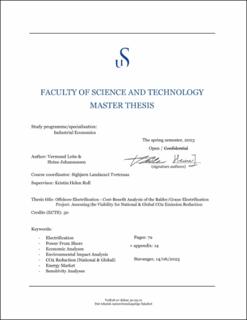| dc.description.abstract | This master's thesis examines the Balder/Grane Electrification (BGE) project as a case study to evaluate its economic viability and environmental benefits by utilizing Power from Shore for the offshore facilities. The primary research question of this study is to assess the financial feasibility of the project and its potential to contribute to the reduction of both national and global CO2 emissions. The study evaluates important factors such as net present value (NPV), internal rate of return (IRR), payback period, and CO2 emissions to understand the potential benefits of the project.
By utilizing a combination of qualitative and quantitative data, this thesis integrates both qualitative and quantitative research methodologies. Through collaboration with Vår Energi and use of relevant reports and studies, this thesis provides analyses of the BGE project. To address uncertainties regarding future market trends and global CO2 impact, research and data comparisons have been conducted to ensure the reliability of the estimates.
The economic analysis calculates a positive NPV for the BGE project at a 4% discount rate after tax, indicating a net economic gain. However, when using a 7% discount rate, the NPV turns negative. Furthermore, the Environmental impact analysis reveals that implementing power from shore as a solution has a significant potential for reducing CO2 emissions both at the national and global levels. While the project successfully reduces CO2 emissions on a national level, the analysis indicates that the global CO2 reduction impact surpasses the reduction achieved at the national level. In other words, the effect of adopting power from shore leads to a greater overall reduction in global CO2 emissions.
Based on the findings and results of the analyses, the thesis concludes that the BGE project with power from shore could be a promising and financially viable solution that holds great potential to reduce both national and global CO2 emission. However, further evaluation of key input variables and additional analysis is required to address uncertainties and ensure the project's economic viability. | |
